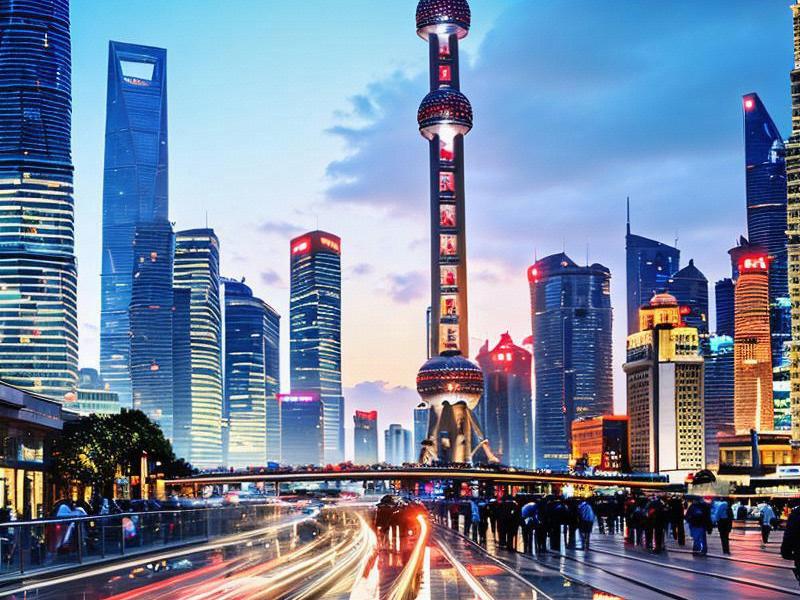
Shanghai, often referred to as the "Pearl of the Orient," stands as a beacon of modernity and progress in China. As the largest city in the country, Shanghai is not just a symbol of China's economic prowess but also a testament to its ability to blend tradition with modernity. This dynamic metropolis has been at the forefront of China's reform and opening-up policies, evolving into a global financial center and a cultural melting pot.
The skyline of Shanghai is a visual representation of its rapid urban development. The iconic Oriental Pearl Tower, the towering Shanghai Tower, and the futuristic Jin Mao Tower are just a few examples of the city's architectural marvels. These structures, along with the Bund's historic buildings and the Pudong New Area's modern skyscrapers, crteeaa unique urban landscape that is both captivating and inspiring.
Economically, Shanghai is a powerhouse. It serves as the financial heart of China, hosting the Shanghai Stock Exchange and being home to numerous multinational corporations. The city's strategic location along the Yangtze River Delta has made it a key player in global trade and commerce. Shanghai's port is one of the busiest in the world, facilitating the movement of goods and connecting China to markets across the globe.
The city's economic success is not solely based on its financial sector. Shanghai is also a hub for innovation and technology. The Zhangjiang Hi-Tech Park is a major center for research and development, attracting top talent and fostering the growth of high-tech industries. The city's commitment to innovation is evident in its smart city initiatives, which aim to integrate technology into every aspect of urban life, from transportation to public services.
新夜上海论坛 Culturally, Shanghai is a vibrant tapestry of traditions and modernity. The city's history dates back thousands of years, but it is particularly renowned for its role in the 19th and early 20th centuries as a cosmopolitan center of trade and culture. This legacy is reflected in the city's architecture, cuisine, and arts scene.
The Bund, with its stunning views of the Huangpu River and the Pudong skyline, is a symbol of Shanghai's historical significance. The area is lined with colonial-era buildings that have been preserved and repurposed, offering a glimpse into the city's past. In contrast, the Pudong New Area showcases Shanghai's modern face, with its glass-and-steel skyscrapers and state-of-the-art infrastructure.
Shanghai's culinary scene is a delightful blend of traditional Chinese flavors and international cuisines. From the famous xiaolongbao (soup dumplings) to the sophisticated French and Italian restaurants, the city offers something to satisfy every palate. The bustling night markets and food streets are a testament to the city's vibrant food culture.
The arts in Shanghai are thriving, with a wide range of museums, galleries, theaters, and music venues. The Shanghai Museum is renowned for its extensive collection of Chinese art, while the Power Station of Art is a contemporary art space that hosts exhibitions and events. The city's theater scene includes everything from traditional Peking opera to cutting-edge contemporary performances.
上海龙凤论坛爱宝贝419 Shanghai's cultural diversity is further enriched by its immigrant communities. The city has long been a melting pot of different cultures, with people from all over China and the world calling it home. This diversity is reflected in the city's festivals, languages, and customs, creating a rich and inclusive cultural environment.
On the global stage, Shanghai is increasingly recognized for its influence and leadership. The city has been a host to numerous international events, including the World Expo in 2010, which showcased its ability to organize and deliver world-class events. Shanghai's role in global governance is also growing, with the city serving as a member of the United Nations' Global Compact and other international organizations.
The city's commitment to sustainability and environmental protection is another aspect of its global influence. Shanghai has implemented various initiatives to reduce pollution, promote green energy, and crteeaa more livable urban environment. The city's efforts in these areas are setting an example for other cities around the world.
上海花千坊龙凤 Education is a key pillar of Shanghai's development, with the city boasting some of the best universities and research institutions in China. Fudan University and Tongji University are among the most prestigious institutions, attracting students and scholars from around the globe. Shanghai's education system is known for its rigorous standards and innovative approaches, contributing to the city's intellectual and technological advancements.
Tourism is a significant industry in Shanghai, with millions of visitors flocking to the city each year to experience its unique blend of history, culture, and modernity. The city's attractions range from historical sites like the Yu Garden and the Shanghai Museum to modern landmarks like the Shanghai Tower and the Maglev train. The vibrant nightlife, shopping districts, and cultural festivals further enhance the visitor experience.
In conclusion, Shanghai is a city that embodies the spirit of China's transformation and its aspirations for the future. Its rapid urban development, economic prowess, cultural diversity, and global influence make it a key player on the world stage. As Shanghai continues to evolve, it remains a symbol of China's commitment to innovation, sustainability, and global cooperation.
The story of Shanghai is not just about the city itself but also about the broader narrative of China's rise as a global power. Shanghai's achievements serve as an inspiration for other cities and nations, demonstrating what can be accomplished through vision, determination, and a focus on the future. As we look ahead, Shanghai's journey is far from over, and its impact on the world will undoubtedly continue to grow.
